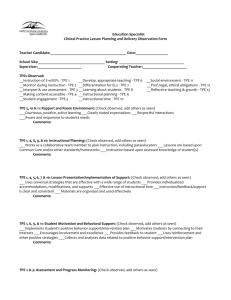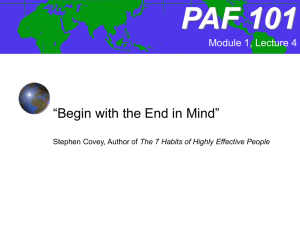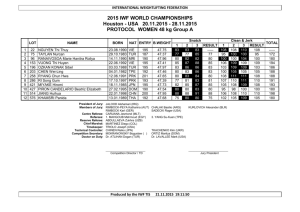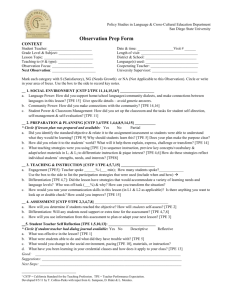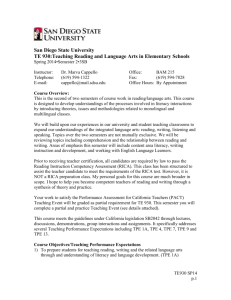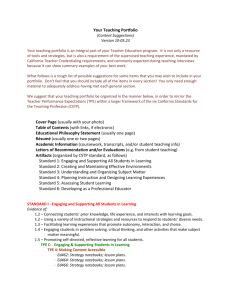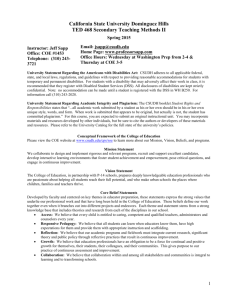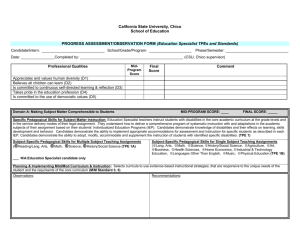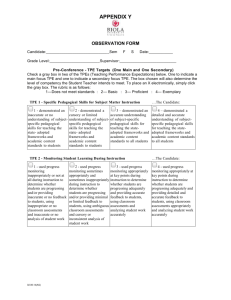Teacher Performance Expectation Supports and Rubric
advertisement
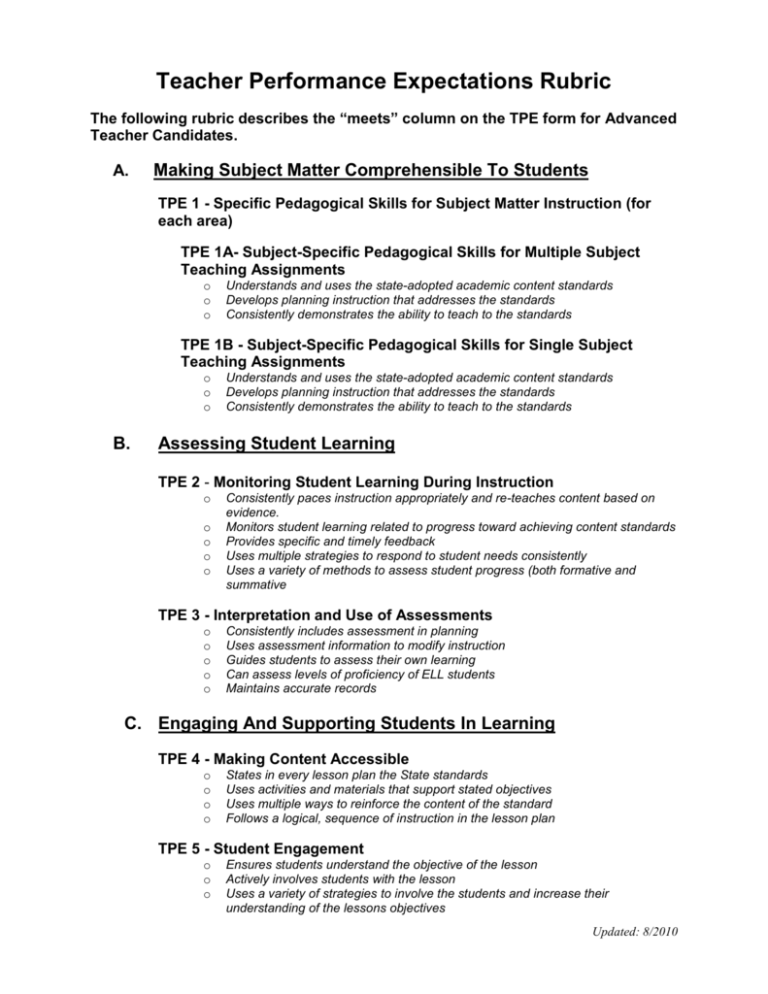
Teacher Performance Expectations Rubric The following rubric describes the “meets” column on the TPE form for Advanced Teacher Candidates. A. Making Subject Matter Comprehensible To Students TPE 1 - Specific Pedagogical Skills for Subject Matter Instruction (for each area) TPE 1A- Subject-Specific Pedagogical Skills for Multiple Subject Teaching Assignments o o o Understands and uses the state-adopted academic content standards Develops planning instruction that addresses the standards Consistently demonstrates the ability to teach to the standards TPE 1B - Subject-Specific Pedagogical Skills for Single Subject Teaching Assignments o o o B. Understands and uses the state-adopted academic content standards Develops planning instruction that addresses the standards Consistently demonstrates the ability to teach to the standards Assessing Student Learning TPE 2 - Monitoring Student Learning During Instruction o o o o o Consistently paces instruction appropriately and re-teaches content based on evidence. Monitors student learning related to progress toward achieving content standards Provides specific and timely feedback Uses multiple strategies to respond to student needs consistently Uses a variety of methods to assess student progress (both formative and summative TPE 3 - Interpretation and Use of Assessments o o o o o Consistently includes assessment in planning Uses assessment information to modify instruction Guides students to assess their own learning Can assess levels of proficiency of ELL students Maintains accurate records C. Engaging And Supporting Students In Learning TPE 4 - Making Content Accessible o o o o States in every lesson plan the State standards Uses activities and materials that support stated objectives Uses multiple ways to reinforce the content of the standard Follows a logical, sequence of instruction in the lesson plan TPE 5 - Student Engagement o o o Ensures students understand the objective of the lesson Actively involves students with the lesson Uses a variety of strategies to involve the students and increase their understanding of the lessons objectives Updated: 8/2010 o o Monitors of students’ progress is ongoing Monitors of equitable involvement by all students is ongoing TPE 6 - Developmentally Appropriate Teaching Practices TPE 6A - Developmentally Appropriate Practices in Grades K-3 o o o Knows the level of student mastery in the class Can Differentiate instruction in terms of groups and reinforcement material Consistently designs practice activities at the level where students can be successful and yet challenged TPE 6B - Developmentally Appropriate Practices in Grades 4-8 o o o Understands important characteristics of the learners Designs instructional activities Provides developmentally appropriate educational experiences TPE 6C - Developmentally Appropriate Practices in Grades 9-12 o o o Understands the importance of the developmental age of the learners Designs instructional activities appropriate to the developmental age of the learners Provides developmentally appropriate educational experiences TPE 6D - Special Education o o o o o Articulates rationale for inclusive education for all students Understands and applies principles of universal design to differentiate instruction Develops modifications and adaptations in curriculum assessment and instruction for students with special needs Understands of roles and responsibilities as members of SST & IEP Teams Collaborates with others to plan, teach and assess students with special characteristics TPE 6E - Middle Level Philosophy and Teaching o o o Understands the major concepts, principles, theories, and research underlying the philosophical foundations of developmentally responsive middle level schools Understands the major concepts, principles, theories, standards, and research related to middle level curriculum and assessment, and using this knowledge in their practice. Values developmentally responsive and socially equitable teaching, learning, and schooling in a variety of organizational settings TPE 7 - Teaching English Learners o o o o o Applies pedagogical theories, principles and instructional practices in English Language Development in accord with state adopted standards Successfully draws information about students’ backgrounds and prior learning Is able to assess levels of literacy in English and students’ first language Analyzes student errors in oral and written language in order to understand how to differentiate instruction Designs lesson to make learning strategies explicit Updated: 8/2010 PLANNING INSTRUCTION AND DESIGNING LEARNING EXPERIENCES FOR STUDENTS TPE 8 - Learning about Students o o o o Understands child and adolescent development to better understand students Uses formal and informal methods to learn about students to assess students’ prior mastery Uses interpersonal interaction s to learn about students’ abilities Connects with the various factors that can affect student learning and modifies instruction to includes all students TPE 9 - Instructional Planning o o o D Consistently establishes short and long term goals Develops sequences of instruction and connects the learning to the students’ prior knowledge and student backgrounds, needs and abilities. Selects strategies/activities/materials/resources that are appropriate for the students in that classroom Creating And Maintaining Effective Environments For Student Learning TPE 10 - Instructional Time o o o Appropriately allocates instructional time to maximize student achievement Effectively and efficiently maximizes instructional time through management based on reflection and consultation Adjusts the use of instruction time to optimize learning opportunities TPE 11 - Social Environment o o o E Understands the importance of the social environment Establishes and maintains a positive environment for learning Creates classroom community through promotion of students’ social competence and natural peer supports Developing As A Professional Educator TPE 12 - Professional, Legal, and Ethical Obligations o o o Takes responsibility for student academic learning outcomes Applies professional and ethical obligations Knows and applies legal obligations TPE 13 - Professional Growth o o Evaluates teaching practice and subject matter knowledge Uses reflection and feedback to improve teaching practice and subject matter knowledge TPE 14 - Educational Technology o o o Maximizes use of instructional technology reflecting all five of the ISTE National Educational Technology Standards for Teachers. See www.iste.org Appropriately applies technology in instructional setting to maximize student achievement Adjusts the use of technology to resources available to optimize learning opportunities Updated: 8/2010 TPE 15 - Social Justice o o o Values and uses socially equitable teaching, learning, and schooling in a variety of organizational settings Incorporates pluralism and divergent perspectives on educating diverse students Strives to democratize public education to achieve social justice and equity TPE 16 – Biliteracy o o o Applies pedagogy, theories, and principles for biliteracy programs Assesses and addressing the needs of biliterate students Designs biliteracy curriculum utilizing developmentally appropriate instructional approaches for biliterate students Updated: 8/2010
